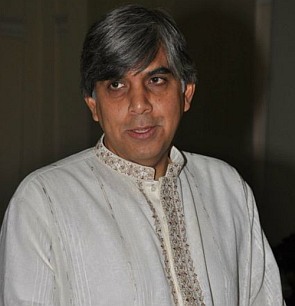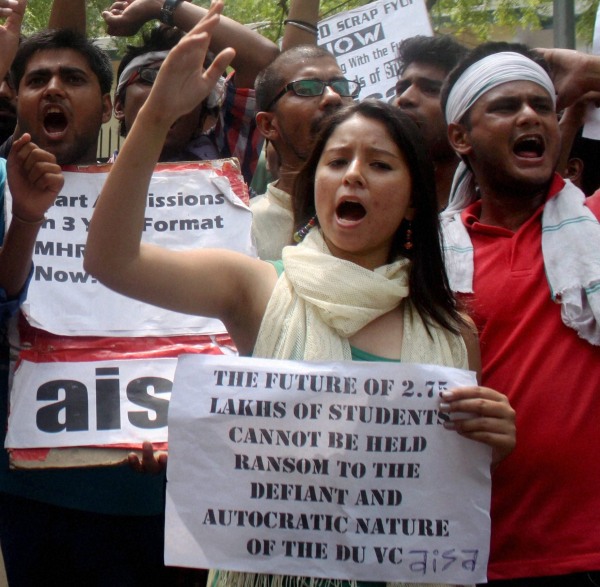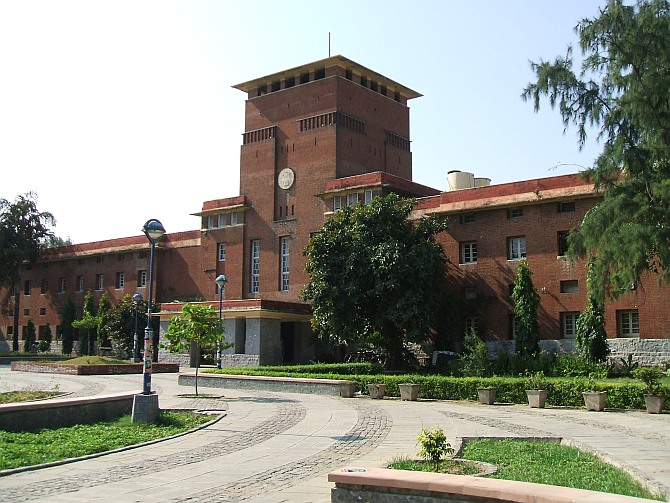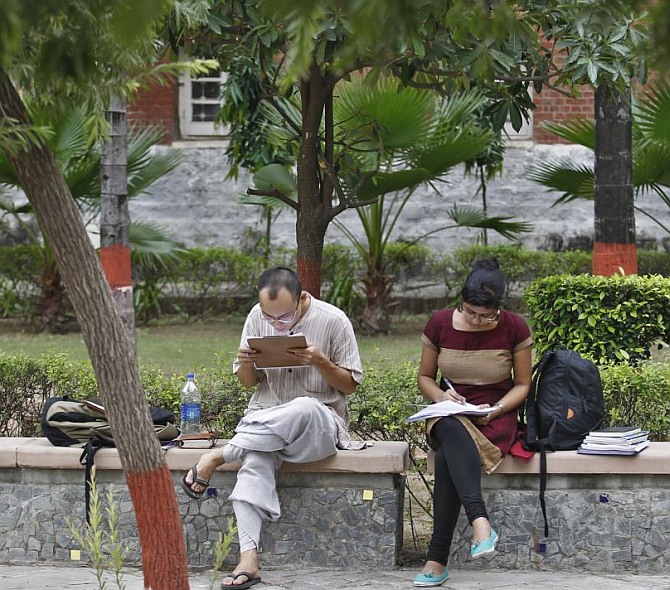 | « Back to article | Print this article |
The mathematician who got his equations wrong
Meet Dinesh Singh, the most controversial Delhi University vice-chancellor till date
Amid angry students marching towards Rashtrapati Bhavan being detained at the Parliament Street police station and others protesting in front of the vice-chancellor's residence in Old Delhi, Delhi University's media advisor, Malay Neerav, held a brief press conference on Thursday.
The university -- read, Vice-Chancellor Dinesh Singh -- he said, was ready to reconsider a three-year honours degree course under its Four Year Undergraduate Programme, or FYUP.
 Neerav said approval of the University Grants Commission, or UGC, was awaited even as admissions had ground to a halt in India's leading university.
Neerav said approval of the University Grants Commission, or UGC, was awaited even as admissions had ground to a halt in India's leading university.
For the past 10 days, Delhi University has been in ferment after the demand for the reversal of FYUP to a regular three-year undergraduate programme found favour in the human resource development ministry and UGC.
And Singh, depending on whether you were an opponent of FYUP (the majority) or a supporter, became a villain or the hero.
There were cries of joy and of condemnation alike on Tuesday when Neerav sent a text message to 139 journalists saying, "VC has resigned."
Subsequently, Singh's supporters, including Pro Vice-Chancellor Sudhish Pachauri, forced Singh to do a rethink.
Please click NEXT to read further...
The mathematician who got his equations wrong
Labelled the "most controversial vice-chancellor till date" by his detractors, many of them part of the university faculty, Singh was lambasted for making FYUP an "ego battle" and refusing to heed UGC's directive to revert to the three-year degree system.
His supporters see in Singh a hero fighting to protect the "autonomy of the University and academic freedom" against the "diktats" of UGC.
The commission, they alleged, was working at the behest of the new government led by the Bharatiya Janata Party, which, in its manifesto for Delhi, had promised to scrap FYUP.
An academic who has known Singh for the past 15 years says the vice-chancellor is a "visionary" who is being unfairly targeted.
The man who evokes such strong feelings either side of the fence is a former student of DU.
After a post-graduate degree from St Stephen's College, he did his doctorate in mathematics from Imperial College in London and returned to his alma mater as a teacher in 1981.
There he was popular among the girls for his "good looks and his oratory", recalls one of his former students.
Please click NEXT to read further...
The mathematician who got his equations wrong
And if current Delhi University Teachers' Association President Nandita Narayan is firmly pitted against him on FYUP, then too, when they were departmental colleagues at St Stephen's, she was perceived as being the polar opposite of him.
Singh admits to enjoying reading, travelling and listening to music. He surprised many when in 2007 he held his first painting exhibition at New Delhi's India Habitat Centre.
A self-taught painter, he says he finds strong parallels between painting and mathematics and believes painting is therapeutic.
Singh took over as the vice-chancellor four years ago, moving up from his role as the director of the university's South Campus, like his predecessor, Deepak Pental. Students were impressed by his open approach -- he took steps for creating additional hostel facilities and started an innovative festival called "Antardhwani" in 2012 which became a platform for students and teachers to embark on collaborative projects.
However, the majority of teachers allege he is aloof and interacts only with his select group of academics. They say he has never met members of the teachers' union even once after taking over.
Please click NEXT to read further...
The mathematician who got his equations wrong
In 2012, Singh mooted FYUP on the lines of American universities.
While the then HRD minister Kapil Sibal wanted it implemented at the earliest, the teachers protested at the manner in which he tried to have the controversial format incorporated in the university without going through the regular processes that take place when as significant a thing as the curriculum changes. Cutting across party lines, the students, through their organisations, AISA, NSUI and ABVP, too voiced their opposition but it went unheard.
Some of his critics concede that FYUP is just the kind of academic reform that is needed to shake up the moribund Indian educational system and bring it on a par with international standards.
However, they feel Singh should not have "hastily" pushed it through. They recall how eyebrows were raised on the campus when a year after FYUP's adoption, Singh was honoured with the Padma Shri by the United Progressive Alliance government before it was voted out of power.
In the final analysis, Singh, being a mathematician, should have known that for an equation to work, the variables needed to be firmly factored in. In the case of FYUP, he left the variables-the teachers and the student body-out in the cold.




